'Big Hero 6' Story Team Robert Baird And Paul Briggs Talk Development And Disney Animation
Earlier this summer, a group of journalists was invited to Disney Animation Studios in Burbank, CA to learn about the impressive process that went into Disney's latest film Big Hero 6. Big Hero 6 is based on, but not linked to, a Marvel comic book of the same name. That makes it the first Disney animated Marvel movie and while the comic and film share very little in common two things they do share are the focus on action and emotion.
We posted a nice long piece about all of the cool tidbits we learned about the film but, we also got a chance to sit down with some of the lead creators of the film. Below, we've go an interview with Paul Briggs, the head of story on the film, and Robert L. Baird, who wrote the screenplay. We discussed the complicated development of an animated film with so many moving parts, what it's like working as a writer at Disney Animation Studios, the schedule and how far the work ahead, writing superhero action that meshes with Disney's sensibilities and why they think Disney hasn't done many sequels.
Below, read our interview with the men behind the story and words in Big Hero 6.
Note: This interview was conducted over the summer after seeing only a few minutes of footage. We'll have more on the film once we see the full thing. 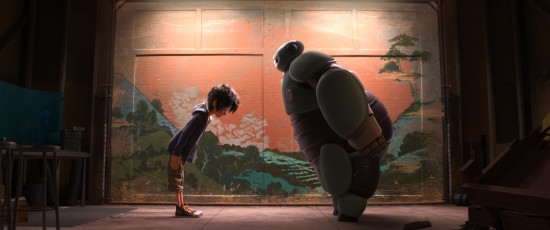 /Film: I'm curious about the interaction between script and design. Because the Production Designer's telling us that the idea for Baymax came up when they learned stuff about soft robotics, but yet you guys are working on a story and a script where that's an integral part of like a lot of the jokes and characterization. Like it almost feels like the chicken and the egg. What came first, how did it develop?Robert Baird (screenwriter): Right, well...Paul Briggs (head of story): Yeah, the design goes into it, but then I think once that design comes into it, you still have to instill character into that design.
/Film: I'm curious about the interaction between script and design. Because the Production Designer's telling us that the idea for Baymax came up when they learned stuff about soft robotics, but yet you guys are working on a story and a script where that's an integral part of like a lot of the jokes and characterization. Like it almost feels like the chicken and the egg. What came first, how did it develop?Robert Baird (screenwriter): Right, well...Paul Briggs (head of story): Yeah, the design goes into it, but then I think once that design comes into it, you still have to instill character into that design.
Baird: Yeah, but I think the idea of soft robotics, like a robot that you can kind of wrap your arms around, came very early in the process. And that informed the script writing or very early on. So the chicken was the soft robotics and the egg was the first attempts at script.
Briggs: But the challenge is, when you're logically gonna design a health robot, [how do you make sure] he's not intimidating when he walks in the room? Does he have built into him everything? And that's part of it. The logical design of it. But just keeping him a healthcare robot through the entire film was a challenge. And always keeping him not a learning robot who was, climbing different things, it was always staying true to that. And that interaction then with Hiro, this 14 year old kid and how those things worked together was difficult. It was a difficult thing to kind of craft and develop.
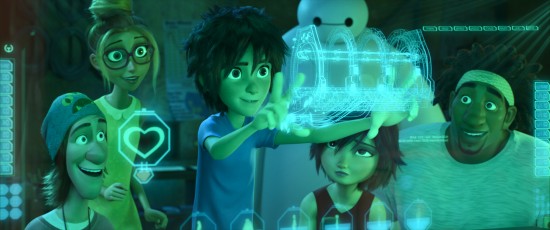 Right. Yeah, absolutely. Now obviously your job to make the story is of primary importance. That takes about two-thirds of the whole process. But in its first inception, this is [co-director] Don's [Hall's] idea. So how does he pick who is going to do what? How do you guys get involved? Because obviously Disney Animation does only a movie every year or so. So if it's something you're not passionate about, how does that work?
Right. Yeah, absolutely. Now obviously your job to make the story is of primary importance. That takes about two-thirds of the whole process. But in its first inception, this is [co-director] Don's [Hall's] idea. So how does he pick who is going to do what? How do you guys get involved? Because obviously Disney Animation does only a movie every year or so. So if it's something you're not passionate about, how does that work?
Briggs: When I came onto Frozen, they asked me to come on Frozen. I was like a Princess movie? And it's like 'No, this is a story about siblings.' And this is one of those projects where you're like 'Yeah, I'm on, because it's like God, comic books, yeah.' But you do have to find what's the deeper reason we're making this movie. And that's where I think everybody starts to sign on and say 'Yeah, this is underneath it all. I actually think that's a great way to build a team. You don't want people who are videogame fans, you don't want Princess fans, you don't want comic book nerds, you want people.
Baird: At that point it's critical. Like when you're building a team that's gonna make one of these movies, you don't want everybody to be on the same page. You want like 'Okay, you're a superhero fan.' I'm not. Because the movie has to play to superhero fans and to people who aren't. And but like Paul is saying, but there's this relationship at the heart of the movie, this Hiro and Baymax. That's what everybody's gonna plug into. And that's I think that's what keeps everybody... like when everything else isn't working on the movie and people are crying because it's so hard, I just look at that guy right there [points at Baymax] and I'm like t'Te movie's gonna be fine, because we got that guy in it.'
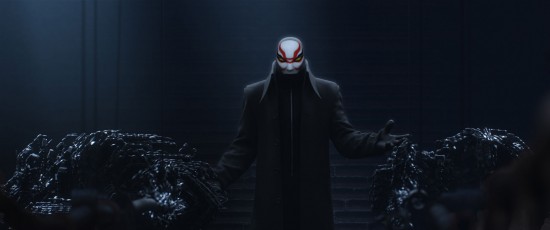 Now when Disney first acquired Marvel a lot of people speculated we're gonna see animated Marvel movies. You know, Wolverine, Spider-Man, then you get Big Hero 6. Which is not a bad thing, but is there a responsibility or pressure knowing this is sort of the first Disney Marvel movie? I get the sense that the Marvelness is just in the D.N.A. but this it's really just a Disney movie.
Now when Disney first acquired Marvel a lot of people speculated we're gonna see animated Marvel movies. You know, Wolverine, Spider-Man, then you get Big Hero 6. Which is not a bad thing, but is there a responsibility or pressure knowing this is sort of the first Disney Marvel movie? I get the sense that the Marvelness is just in the D.N.A. but this it's really just a Disney movie.
Baird: You know what, it's so hard to make any story work that I don't think we ever were thinking like 'Ah, it's extra pressure doing a Disney Marvel mashup.' It was just pressure for making a story that worked, that made sense and was emotional and so on. That's all we're worrying about in there. And then everything is sort of beside the point I think.
Briggs: When you start to find these relationships between Hiro and Baymax, it does hearken back to the reasons why I got into this job. The animation I fell in love with, you know, Mowgli and Baloo. Pongo and Perdita. Dumbo and Timothy. It's like there's these great relationships we've had in the past that I do think is so strong in this film that hearkens back to that classic stuff that they did back then. This is very fresh and unique, but it has that D.N.A. of this is a Disney film.
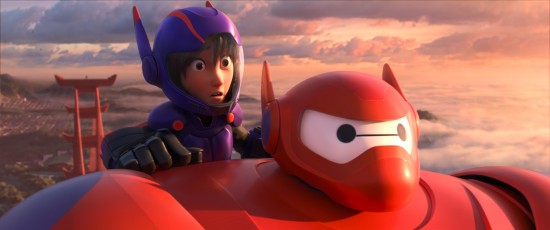 One of the scenes we saw earlier was Hiro and Baymax the first time they're like flying. And that's one of those classic superhero movie, Disney moments that are give you chills. So obviously I understand that comes through when you're developing the story, storyboards, a scene. But how do you write it? How do you write that scene to convey what it's supposed to feel? Because once you add the music and the visuals it elevates it to a whole other level.
One of the scenes we saw earlier was Hiro and Baymax the first time they're like flying. And that's one of those classic superhero movie, Disney moments that are give you chills. So obviously I understand that comes through when you're developing the story, storyboards, a scene. But how do you write it? How do you write that scene to convey what it's supposed to feel? Because once you add the music and the visuals it elevates it to a whole other level.
Baird: Yeah.
Briggs: That's a good question.
Baird: Well you know what, the movie had a version of a flying scene in it for a long time. And for some reason it was just 'Well they're flying. And it's fun.'
Briggs: It was just action for action's sake.
Baird: It's action for action's sake. So the way that scene started to actually work was when we said 'Well what's the scene about?' Baymax is a healthcare robot. And he is trying to help Hiro and he's trying to heal Hiro. That's what that scene is about. And at that point we said Baymax falls off that bridge because he knows that this moment is helping Hiro heal. He's bringing joy to Hiro. And suddenly the scene just started to work in a way that it never did before. And so and then you add the music and everything else and it elevates it. But I think you're feeling something because the scene is about something.
So you scripted in the characters falling off the bridge and stuff? Is that all in the script?
Briggs: Well I think we had the idea that yeah, he needs to notice – if I remember the pages for that – it was really well thought out and detailed, but it was kind of like we need something, I don't know if the fall was necessarily there.
Baird: I don't know if the fall was in there, but it was...
Briggs: We do need to recognize like the patient is being healed.
Baird: That's right.
Briggs: Like the treatment is working. And so Dean Wellins boarded that sequence. He's one of our best. He's a Director here, one of our best storytellers. And he also did boarded Let It Go and it's like 'Wow, that guy boarded a big Princess song, but then he also boarded this crazy robot flying.' And he's great at that, finding those moments of like 'Okay, we need to Baymax to recognize the treatment is working, so what do you do?' And he's like I'm just gonna do a deadfall off this... And it's like wow.
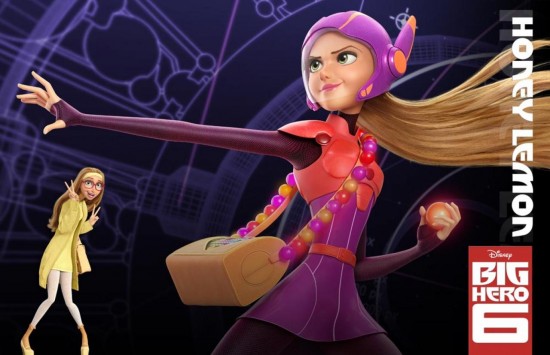 That was very cool. One of the other things I liked today, one of the little details I picked up on and really enjoyed was Honey. The fact that she has her purse with all this complicated chemistry in it. That's just so awesome. At what point did that idea come about specifically?
That was very cool. One of the other things I liked today, one of the little details I picked up on and really enjoyed was Honey. The fact that she has her purse with all this complicated chemistry in it. That's just so awesome. At what point did that idea come about specifically?
Briggs: Boy, I think that was early on.
Baird: It was pretty early on right?
Briggs: Yeah.
Baird: It was the idea of she loves chemistry. She is a chemistry student. And that's gonna be her superpower. And how do you take chemistry and bring it into her superhero suit and so on? It's like 'Well what if she's got this purse?'
Briggs: This walking chemical lab.
Baird: Yeah, she's very fashionable. She's fashion forward and so on. It's like 'All right, well her purse is now like a chemical arsenal.'
Briggs: Actually, if you kind of think about it, it may be the most dangerous thing, because it is like a little bomb of craziness that could go off at any time,
Baird: Oh my gosh, yeah. But it's such a cool design, I love it, yeah.
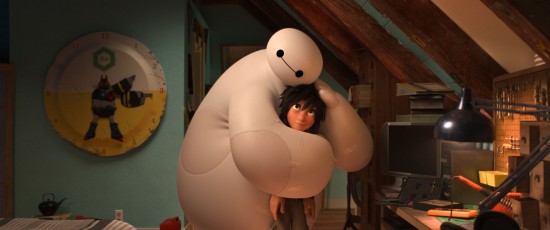 Yeah. Now, after Frozen was such a massive hit for you guys, a lot of people were asking are you going to do Frozen 2 and Bob Iger talked about it a little bit. And this movie is an origin story that feels like it lends itself to more. But I don't want to ask the obvious about a sequel. My question is more if you look at the history of Disney Animation, they've never really released a theatrical sequel. Pixar does. But, you know, Return of Jafar and stuff is always direct to DVD. What is the deal here about sequels? Is it just that you've never an idea that's strong enough? Or is it that there's always more new ideas?
Yeah. Now, after Frozen was such a massive hit for you guys, a lot of people were asking are you going to do Frozen 2 and Bob Iger talked about it a little bit. And this movie is an origin story that feels like it lends itself to more. But I don't want to ask the obvious about a sequel. My question is more if you look at the history of Disney Animation, they've never really released a theatrical sequel. Pixar does. But, you know, Return of Jafar and stuff is always direct to DVD. What is the deal here about sequels? Is it just that you've never an idea that's strong enough? Or is it that there's always more new ideas?
Briggs: It might be that. Yeah, I mean, we did do like Rescuers Down Under and so we have released sequels.
Oh okay.
Briggs: But I think it is, is the story strong enough to support that?
Baird: I think that's what it is more than anything. It's all driven by story here. So have we told all the story that there is to tell? Or is there more story to tell? And that's always what's gonna drive whether there's a need for a sequel, at least here in this building.
Briggs: Yeah, I'm really excited about here too because we got Frozen and we got this movie and then we've got Zootopia coming out. And I don't know what else...
They've said Zootopia but beyond that we don't know anything yet.
Briggs: Okay, I was like 'I just got in a huge amount of trouble.'
No, we knew that.
Briggs: But it's like, I mean, the films we've got lined up for three or four [years down the road], they're all so unique and different from one another that it's like 'Wow, this is a pretty brilliant.'
Baird: Yeah, nobody's gonna know what's coming next. It's we're never gonna fall into like 'Oh that again?'
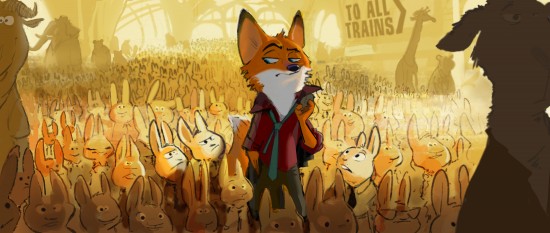 Yeah, Frozen 4. And the last thing, you mentioned Zootopia and we also talk about how long these movies take, so obviously we know about Big Hero 6 coming out this year. Zootopia in 2016. And then there's a bunch of other undated movies. What is the sort of hierarchy here? How do things break down per department? When do people like switch over? Like tell me a little bit about how it works from project to project to project in the office here.
Yeah, Frozen 4. And the last thing, you mentioned Zootopia and we also talk about how long these movies take, so obviously we know about Big Hero 6 coming out this year. Zootopia in 2016. And then there's a bunch of other undated movies. What is the sort of hierarchy here? How do things break down per department? When do people like switch over? Like tell me a little bit about how it works from project to project to project in the office here.
Briggs: Yeah, I mean, I just, it's kind of one of those things where it's like I was on Frozen. They asked me to come on to Big Hero 6 and I was like yeah, 'Hell yeah, I'll jump on the Big Hero 6, I wanna make that.' You try to build a team that is right for the movie. And we were talking about this earlier, you don't get everybody who is excited. You just try to build teams that are like who's gonna service the story best?
Baird: In this building, there are like a half a dozen movies in some stage of development. And sometimes the teams, like in the very early stages, the teams are very small. It's like it's a director and a writer sitting in the room for a year trying to crack the story. But then as you get farther along in the production it starts to balloon and balloon and balloon.
And people finish one movie, they can start jumping in.
Baird: Absolutely. But everybody's helping everybody else. Like even though it's like a director and a writer sitting in a room by themselves we'll go on and we'll hear their pitch for a movie that's gonna come out seven years from now.
Briggs: Right. Yeah, I was just last week in a meeting with a guy and I was like I, we're talking about a movie that's coming out in 2020. This is crazy.
Baird: Yeah.
Briggs: So it's like I love that. I love the early stages of crafting a film and just trying to find it. It's not easy.
